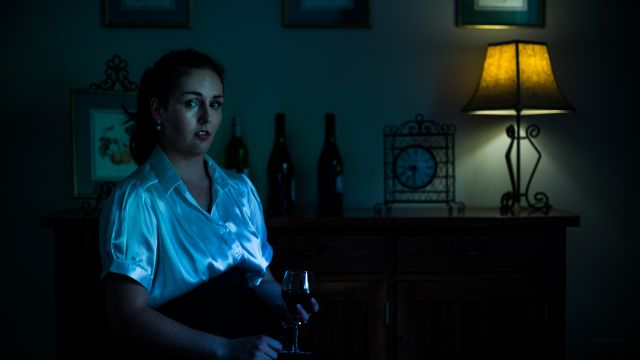When I Awoke
A woman paces restlessly in her luxury London apartment. Her life and career are in ruins, her relationships smashed and lost. But what ‘wakes’ her is that her formerly estranged sister has sent her a one-way plane ticket ‘home’. What is ‘home’? As a home town, it is Mossman in far north Queensland. The Woman confides in us – rather than thinking aloud. She reluctantly visits her past: remembering that ‘home’ was a place of heat, abandonment, silence, boredom and mediocrity. She has tried to expunge it from her memory by reinventing herself, by work, by drugs... Now she reviews her past so as to decide her future. She must decide whether to use that plane ticket or not, and if she will, she must leave by 9.30 to get to the airport.
When I Awoke is billed as an ‘opera’, but it more closely resembles a confessional monologue, much of which is sung. The Woman (Kelsey Cotton) is alone on stage (her musical accompanists are hidden) for an hour and in that sense When I Awoke is a real accomplishment. The text – spoken and sung – is complex and detailed. Ms Cotton is a trained and talented singer with a sure stage presence.
The spoken word alternates with brief songs, some of which are almost conversational, some are witty or bitter or cynical, and others are full of pain and regret. It is difficult, however, to grasp the principle by which James Christensen has decided what is spoken and what is sung. I would guess he has proceeded by his musical instinct – that is, he has heard the music inherent in some passages of the Woman’s story, and in other passages he opted for speech. But it feels a little arbitrary in that why speak what could be sung, why sing what could be spoken?
There are no ‘tunes’ per se (tunes in opera and music theatre seem to be unfashionable or out of favour, or simply considered old hat and naff), and much of the songs sound more like recitative without scansion or rhyme. The music, however – from Imogen Cygler, piano, Naomi Lennox, clarinet, and Jackson Fumberger, violin - supports or illuminates or counterpoints the words beautifully and so expressively at times that a phrase hangs in the air and moves us in its own right. We almost stop listening to the words. The music, unfortunately, also often overpowers Ms Cotton, either speaking or singing, and the text is lost - something Mr Christensen, as director, could surely have avoided.
It seems to me that here the musical ideas came first. I may be entirely wrong, but the music per se is of greater power and emotion than the rambling text it supports. Sad but unsentimental, and psychologically insightful and convincing as the Woman’s story is, it is curiously unengaging and therefore unmoving. That’s no reflection on Ms Cotton or the musicians. It may be because vital bits of text are drowned out, or because there’s a whiff of fatal self-pity about it all. We don’t invest in The Woman’s decision and we wonder just why we are being told this story. With so much talent evident, we are left feeling rather dissatisfied and ambivalent, wishing that all these talents had been devoted to something clearer and stronger.
Michael Brindley
Subscribe to our E-Newsletter, buy our latest print edition or find a Performing Arts book at Book Nook.

